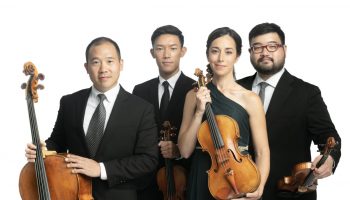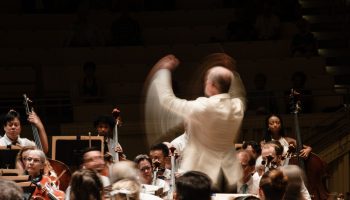
Liz DeLillo
Staff Writer
Whether you’re an Italian Baroque opera fanatic or entirely unfamiliar with that tradition, tonight’s Chautauqua Opera Conservatory recital features a variety of reimagined classics for lovers of tradition and innovation alike.
“This is a concert not to be missed, that’s all I can say. There’s nothing dull,” said pianist and Opera Conservatory faculty member Laura Ward. “… It’s going to be modern music, and yet it is not what we think of as modern music; it’s all accessible and fresh and sophisticated and elegant.
It’s wonderful.”
Opera Conservatory students will perform these reimagined Italian songs at 6:30 p.m. tonight in Fletcher Music Hall. The pieces were commissioned by the Denyce Graves Foundation, which partnered with Lyric Fest to premiere them earlier this year. This evening’s recital features arrangements by JoyAnn Amani, Uzee Brown Jr., Sylvia T. Hollifield, Joseph Joubert, Donald Lee III, Will Liverman, Michael McElroy, Marvin Mills, Dave Ragland, Carlos Simon, Evelyn Simpson Curenton, Damien Sneed, Louise Toppin, Diane White-Clayton and Khyle B. Wooten.
Ward is a distinguished pianist and the artistic director of Lyric Fest, a Philadelphia nonprofit dedicated to reinvigorating voice recitals. She is also a recording artist and editor of song accompaniments for publisher Hal Leonard.
“We’ve been doing (Lyric Fest) for 23 years, and the good news is we’re never going to run out of themes because there are so many artsongs out there in the world, and we are always commissioning new works ourselves,” Ward said.
For reinvigorating these classical Italian songs from past centuries, Lyric Fest partnered with the Denyce Graves Foundation and premiered them in April 2025. They commissioned America’s premier Black composers to reimagine these works, which were then performed by DGF artists. Opera Conservatory Artistic Advisor Denyce Graves-Montgomery — artistic director of the foundation she established — will speak briefly about the project at the recital.
“It was the perfect collaboration to premiere these works, and I’m excited to be at Chautauqua for this performance,” Ward said. “I’m honored and thrilled to bring those here.”
Just before the songs premiered in Philadelphia at the “Everything Old is New Again” concert, Ward said, the composers held a talkback.
“They were thrilled to be asked to do it. They had grown up with these songs,” Ward said. “Then Denyce was there for the second performance, so she was able to talk from a singer and a voice teacher perspective about how important this repertoire is.”
Although the piano accompaniment for each piece has a new sound, the vocal melodies remain closer to tradition.
“The singers, for the most part, are singing the same melodies that have been written down since the 1600s, 1700s,” Ward said. “… But now we have these elevated, exciting, fun, poignant arrangements that people are just gonna love — and that’s what we’re doing.”
Bubbling with excitement for the upcoming recital, Ward provided further details about the performance.
“There’s going to be 17 of these newly arranged songs on the concert on Wednesday night, and it’s really something that shouldn’t be missed,” Ward said. “And it turns out that one of the composers is one of the staff pianists this summer.”
Ward was referring to Lee, a pianist and conductor commissioned to compose an arrangement of Italian Baroque composer Antonio Caldara’s “Alma del Core.” Lee shared the story of how he became involved in the project.
“It’s just funny how it happened because I was working at North Carolina Opera in December, I think it was, and I was music directing The Passion of Mary Cardwell Dawson, in which Denyce Graves plays the lead role,” Lee said. “I tend to during breaks just kind of like sit at the piano and improvise whatever comes to my head, and I was just making some stuff up, and Denyce heard it, and she said, ‘Hmm, could you write your arrangements down?’ ”
Within a few months, Lee’s arrangement was complete. Providing some insights into his decisions while composing, he explained how he wanted to keep the vocal line intact.
“I kept that line absolutely the same, and I also kept the harmonic structure as far as the function of the chords and where they went the same. I didn’t want to reinvent that wheel, but my voice fleeting, the sort of altered dominance and cord mutations and some of the things that I did gave it a little bit more of, in some measures, kind of a gospel feel and a soulful feel that reflects the text just in a modern way,” Lee said. “But then for the B section — kind of to connect it back to the original Baroque period that it was from — I wrote a two-part piano invention to accompany that line.”
While these new arrangements offer enough excitement by themselves, Ward highlighted how transformative and re-imaginative projects like this are integral for music education.
“In the singing world and in the voice teaching world, we’re all familiar with these melodies, but now, thanks to Denyce Graves, they have a fresh, new, American, exciting sound,” Ward said. “… I’ve been doing this for 40 years, and I have to tell you: What they came up with — what these young composers have come up with — are sounds and arrangements that people could use on recitals in this time, and the audience will love them there. I can’t say enough about how special they are.”




